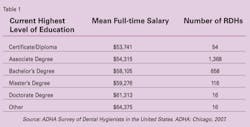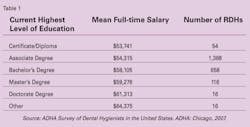Advancing our profession
by Christine Nathe, RDH, MS [email protected]
One common position that has been embedded in the majority of the past dental public health columns is the realization that in order to enhance and advance the practice of dental hygiene, dental hygienists must embrace their unique role in advancing their education. It is notable that most dental hygienists featured in this column have done just that, and by educating themselves, they have been able to have a tremendous positive impact on their patients and their communities.
Many dental hygienists believe that they are at their maximum potential clinically, regardless of education, and that more education does not necessarily lead to greater income potential. Respectfully, I disagree with both of these opinions.
I am that dental hygienist who was educated at the associate’s degree level upon entry into the profession. I can wholeheartedly attest that I became a much better dental hygienist — yes, clinical dental hygienist — with each degree. No question about it. Additionally, I just finished my first course toward a doctorate degree, and I feel I have learned much that I am able to bring to my patients ... and I am still learning. My salary has not been hurt by my additional degrees either — not one bit.
As a profession, if we want to assure future opportunities in this unstable economy, I believe we need to expand our practices in directions that increase access to dental hygiene care to the underserved, decrease oral health disparities, and build oral health equity for all. We should apply our research advances to ultimately benefit society.
Technology is advancing, and we should be developing technologies that advance dental hygiene. We need educated dental hygienists to do this. If we want to expand our scope, we must expand our education. If we want to ensure our practice is based on scientific evidence, as opposed to ritualistic practice, we need to be more educated. If we want to be involved in more health-related leadership roles, we need to be at comparable educational levels as other health-care providers and leaders.
ADHA’s Focus on Advancing the Profession also recommends the BSDH as the entry-level position. As individual dental hygienists, each of us needs to put plans into play to accomplish this. Americans value education, and the more educated we become, the more we will have a voice. This voice will ensure that individuals with expertise in dental care, such as dental hygienists, are the same individuals who will foster and promote changes in the delivery of dental care.
Too often, others speak for us ... those without our specialized knowledge and without clinical practice experience. We have the skills; now we need the additional education to make this work.
Did you know that the more educated a dental hygienist is, the more likely he or she is to volunteer work?1 Did you know that the more educated a dental hygienist is, the more money he or she reported making in a year?1 Did you know that there are recommendations from national entities to expand the educational preparation of dental hygienists?2,3 Did you know that dental hygienists with more than one state license are more likely to have a bachelor’s degree or higher, and these dental hygienists earn a higher income than dental hygienists with just a single license?1 Did you know that the majority of dental hygiene program directors feel that advancing entry level education to the bachelor’s degree is either very important or imperative?4 Did you know that dental hygienists with at least a BSDH degree have an easier time obtaining employment than those with less education?4 These are significant and applicable reasons for a dental hygienist to advance his or her education. See Table 1.
So there are significant reasons why, at this time in the nation, it is imperative that dental hygienists become more educated. Advanced degrees offer more opportunities as private practice positions diminish. I have never heard of a dental hygienist with a bachelor’s degree or higher who is unhappy about the choice to continue his or her education. However, I do know many dental hygienists who feel unfulfilled with their current educational level and would like to have more career options available to them today.
If you truly have a passion for dental hygiene and health care, there is no more appropriate advanced degree than one in dental hygiene. If you strive to increase your opportunities in dental hygiene or want to be the best clinician you can be, then it is logical to pursue your higher degree(s) in dental hygiene. Further, if you want to be an expert in dental hygiene, continue your education. Numerous distance-learning programs are available today. For more information on degree completion programs and master’s programs in dental hygiene, visit www.adha.org/careerinfo/.
References
1. ADHA Survey of Dental Hygienists in the US. ADHA: Chicago, 2007.
2. ADHA Focusing on Advancing the Profession. ADHA: Chicago, 2005.
3. Institute of Medicine and National Research Council. Improving Access to Oral Health Care for Vulnerable and Underserved Populations. Washington DC: The National Academic Press, 2011.
4. ADHA Dental Hygiene Education Program Director Survey. ADHA: Chicago, 2008.
Christine Nathe, RDH, MS, is a professor and graduate program director at the University of New Mexico, Division of Dental Hygiene, in Albuquerque, N.M. She is also the author of “Dental Public Health Research” (www.pearsonhighered.com/educator), which is in its third edition with Pearson. She can be reached at [email protected] or (505) 272-8147.
Past RDH Issues

